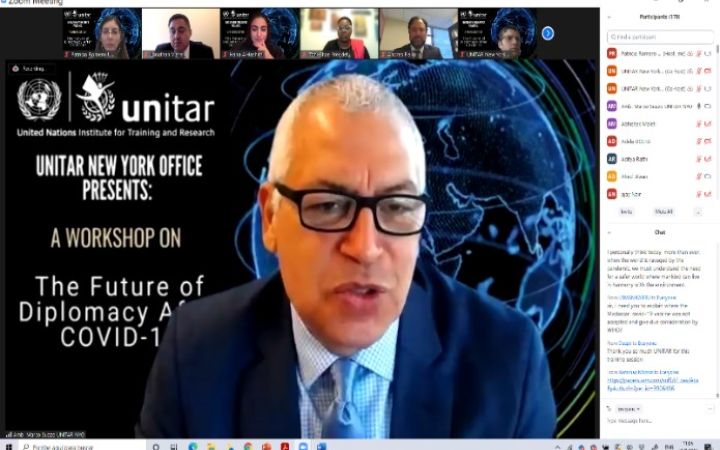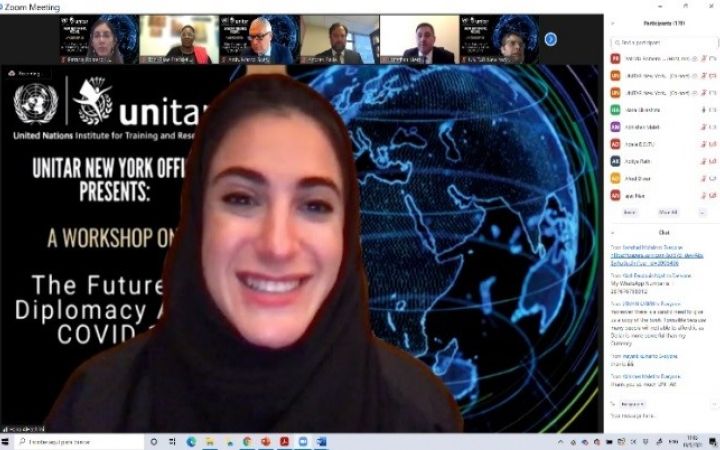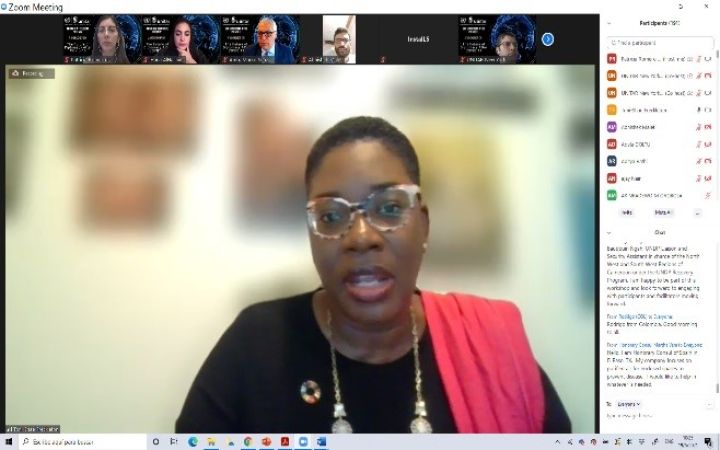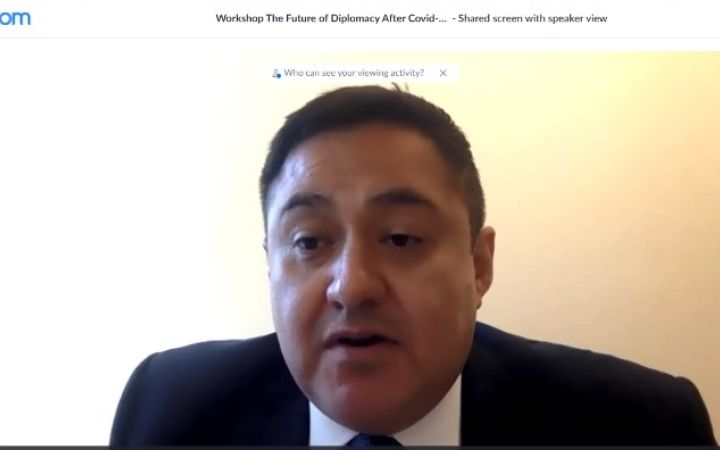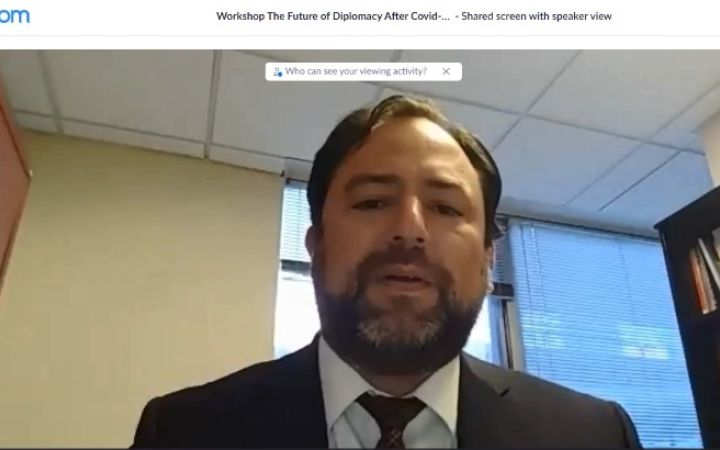19 May 2021, New York, United States. - The UNITAR New York office conducted a workshop entitled “The Future of Diplomacy After COVID-19”. After a year like no other, it explored the impact the global pandemic has had on international cooperation and offered perspectives on what the future of multilateralism has in store. The course took place in an online format attracting 190 participants from more than sixty countries.
The workshop was based on the book “The Future of Diplomacy After COVID-19” written by Ms. Hana Alhashimi, Emirati Member of the Secretary-General’s Internet Governance Forum Multistakeholder Advisory Group, Ms. Toni-Shaw Freckleton, Senior Adviser in the Office of the President of the United Nations General Assembly (UNGA) and a Jamaican Civil Servant, Mr. Jonathan Viera, Ecuadorian Diplomat and former Senior Adviser in the Office of the President of the UNGA, Mr. Andres Fiallo, Ecuadorian Diplomat and former Senior Political Adviser in the Office of the President of the UNGA, Ms. Mona Ali Khalil, Public International Lawyer, and Mr. Vahd Mulachela, Indonesian Diplomat with experience in bilateral and multilateral affairs and former Senior Advisor in the Office of the President of the UNGA. They are the authors who have worked directly in International Public Policy and the establishment of global agendas at the United Nations.
Mr. Marco Suazo, Head of UNITAR Office in New York, opened the workshop with a warm welcome to participants and expressed his gratitude to the speakers for their participation. During the introduction he highlighted the challenges the post-pandemic will pose in the international scene. The human security was at risk and the consequences of the pandemic are seem globally, he emphasized.
Reflecting on current global trials, Mr. Suazo noted that multilateralism is suffering, and international organizations must strengthen their structures and capacities to solve real problems and offer greater results.
Mr. Suazo, who was also the moderator of the workshop, then passed the floor to the facilitators who spoke in their personal capacity and described the lessons that can be learned in the wake of the massive global disruption. During their remarks, panelists covered a wide array of topics, including the future of Sustainable Development, Economic Diplomacy, International Peace and Security, and Digital Cooperation. Ms. AlHashimi highlighted that the world is a lot more focus on the future and countries on the need to collaborate outside their borders. People believe on the potential of international cooperation to solve global challenges, she noted. Ms. AlHashimi pointed to the considerations and principles needed in a middle of a crisis and the importance of multilateralism. She also provided a practical perspective of:
- What is desirable for the future in terms of international relations
- How digital cooperation and technology have completely shifted the way the world works
- How technology has increased the impact of people’s lives
The moderator welcomed Ms. Toni-Shae Freckleton who elaborated on the future of Sustainable Development. She pointed to the importance of global cooperation and solidarity as the central to responding to and mitigating the health and socio-economic effects of the COVID-19 pandemic and the implications in the short and long term. She also mentioned the slow progress of some SDGs but at the same time considerable efforts made by stakeholders, governments, and NGOs.
In addition, Ms. Freckleton was optimistic of governments’ approaches to social development and to the green recovery which is more important than ever before. Multilateral organizations must strength their capacities and be prepare for new challenges, she added. The collection of data to explore new scenarios that have not been considered before and anticipate the future of the SDGs is key for multilateralism in general. We all are actors as agents of change, she emphasized.
The following speaker, Mr. Jonathan Viera, covered the session entitled “The Future of Economic Diplomacy” and explained that that chapter of the book itself focus on international trade, debt, and descent work and how the pandemic affects those areas. He also emphasized the role of multilateral organizations and specialized agencies may have in terms of defining their route to showing their will and capacity to face different positions and demands from Member States.
Mr. Viera noted that from 2015 to 2019 the global economy had stability with some significant progress but now, the COVID-19 crisis is showing systemic vulnerabilities and complicating the progress of the Sustainable Development Goals. He also highlighted how the pandemic reflects the perfect storm encapsulating long-standing-fiscal situation and additional needs for collapsing incomes. The world is facing the loss of 24 million jobs. At the end, Mr. Viera mentioned that financial situation requires tailor-made solutions, leadership and political decisions.
The moderator welcomed Mr. Andres Fiallo who provided information on the future of international peace and security. As an example, he mentioned that during the first months of the pandemic, the Security Council took four months to adopt resolution 2532 which expresses the grave concern about the devastating impact of the COVID-19 pandemic. One of the main reasons why the Security Council took such a long time was a discussion on a reference to the World Health Organization (WHO). This was the reality last year but now it has changed, Mr. Fiallo noted.
Mr. Fiallo also elaborated on the UN and if it was or not ready to the impact of COVID-19. He said the UN was ready in terms of analysis of threats but not in terms of methods of work, logistics, equipment. The COVID-19 pandemic has forced the UN to postpone several key meetings related to illicit traffic of arms, nuclear-test-ban treaty, among others, because the lack of big conference rooms (to keep distance), travel restrictions, and other logistical challenges. Now, it is on the table to postpone other meetings, but he hopes the UN can be in the position to deal with big problems as the COVID-19 pandemic.
In conclusion, Mr. Suazo and the panelists conducted practical conversation with the audience and looked at the lessons learned from the period spanning the World Health Organization’s first declaration of a public health emergency of international concern. They all agreed that diplomacy is likely to show larger players, such as a more organized civil society.
At the end, Ms. AlHashimi, Ms. Freckleton, Mr. Viera, Mr. Fiallo expressed their sincere gratitude to the UNITAR New York office for its support to make this workshop possible.


